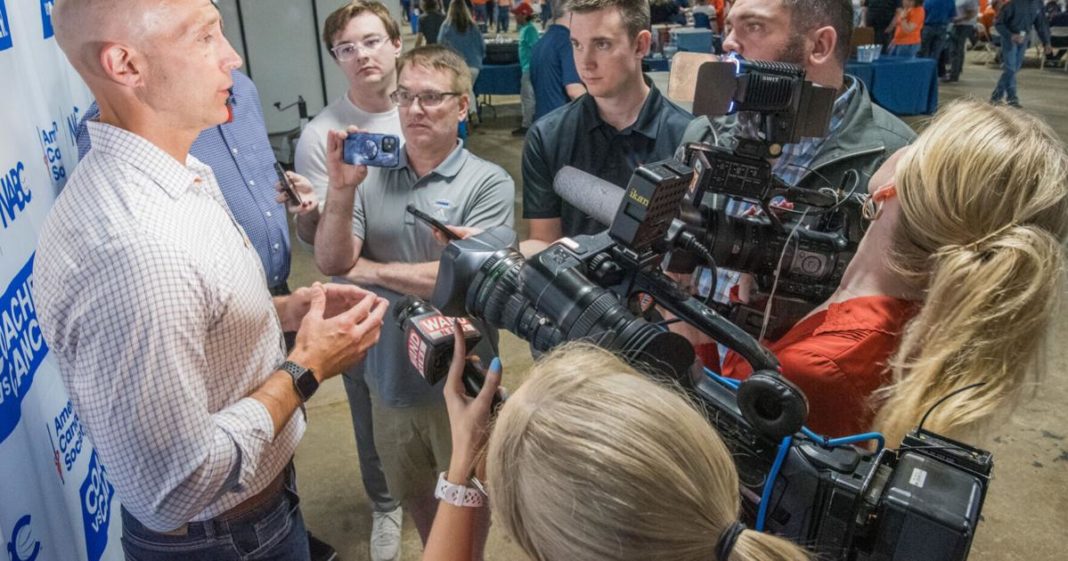CHAMPAIGN â In a once-smooth period of roughly 100 years, since Red Grange awakened America to the charm and ferocity of college football, major athletic departments have thrived in presenting multi-sport programs … with football subsidizing all those non-revenue sports.
We will now see a complicated and dramatic change in that arrangement because the nationâs court system has proven to be far more powerful than the once-impregnable NCAA.
We have come to recognize that amateurism canât exist when millions of TV dollars are in play. The participants deserve their fair share.
The collection of NCAA schools would fight the change if the case was winnable, but multiple decisions since Alston v. NCAA have shown the folly of bucking U.S. law.
So, in avoiding a trial that could have bankrupted the system, a $2.8 billion settlement has been agreed to by the NCAA Board of Governors and the five major conferences â Big Ten, Pac-12, Big 12, SEC and ACC â even as 20-plus lesser conferences see it as unfair for them to make payments on behalf of athletes who mostly performed in those Power Five conferences.
Financial matters
Delving, after weeks of uncertainty, into a subject beyond my pay grade, here is roughly what a settlement of House vs. NCAA, along with two other antitrust cases, will mean for an Illinois athletic department.
â A required $300 million outlay over 10 years, including retroactive name, image and likeness payments dating to 2016 before they became available in 2021. Athletic director Josh Whitman will have a year to prepare for the annual $30 million payments, beginning in the fiscal year of 2025-26. It will amount to roughly one-fourth of what has been the Illiniâs annual budget. It comes at a time when interest rates on borrowing are particularly high for a department that is already nearly $300 million in debt.
â Illinois can expect smaller than expected distributions from the NCAAâs home office, which must handle its anticipated portion of the settlement.
â With DIA payouts, past and future, going directly to players, Whitman must decide how to handle soccer, softball, baseball and others that are ânon-revenueâ of nature and seldom televised. Will some sports follow fencing and menâs swimming to the sideline, or join other nearby schools in workable new leagues?
Pinching pennies
Whatâs happening became inevitable as footballâs TV income grew to epic proportions. Reports this past week indicate that each Big Ten member received $60 million in the fiscal year now ending, while SEC members took in $51 million.
Those numbers were projected to climb toward $80 million … but now, due to the settlement, distributions will turn the other direction.
Trouble is, that money was already spoken for. Athletic programs like Illinois have taken on recurring debt in constructing lavish facilities, supporting up to two dozen or more teams (Illinois has 19), continually growing staff and paying coaches outrageous salaries … just as donors have become more inclined to fill NIL coffers than institutional chests.
And now, the courts have made it clear that those who provide the sweat â and risk of injury â on the football field deserve the rewards.
Too many questions
Whatâs left for athletic departments may not be as severe as Pompeii after Mount Vesuvius erupted, but it could be devastating in its own way.
Some lesser universities may consider bankruptcy. Some venerable sports could be cut (menâs gymnastics might not survive).
There is talk of Congress stepping in but that seems unlikely. Itâs more likely that leading football programs will ultimately leave the NCAA behind for what amounts to a semi-professional football league with their own rules and financial guardrails … thereby avoiding Title IX complications.
No one would be surprised if football and basketball ultimately go their own way, while other sports look for new income sources (student fees?) and perhaps new geographic leagues that limit the ridiculous travel that some are faced with.
Loren Tate writes for The News-Gazette. He can be reached at ltate@news-gazette.com


